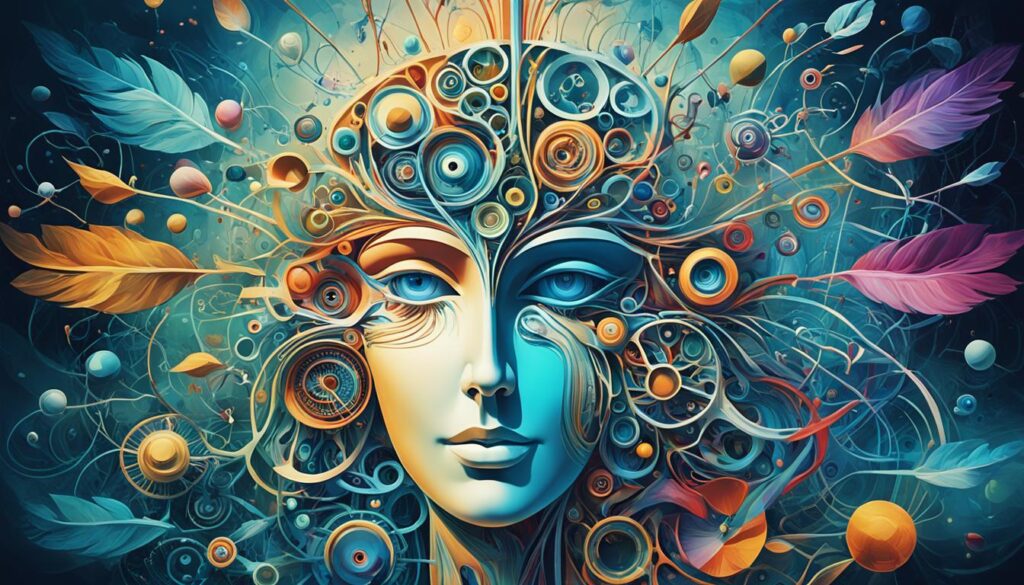The Psychology Behind Dream Analysis
Have you ever thought about why your dreams are so strange and vivid? Dream analysis can help us understand our dreams. It shows us what our dreams might really mean.
We are going to look at dream analysis psychology. We’ll see what science and tips are used. Also, we’ll look at its good points and the things it can’t do. And we’ll look at what it meant in the past and in different cultures. Get ready! We’re going on a trip of finding out about ourselves. We’ll go deep into our subconscious. And we’ll learn about dream interpretation.
Here’s a big question for you to think on: What hidden truths about ourselves might our dreams be revealing that we’ve never before recognized? The answers could really surprise you.
Understanding the Subconscious Mind
Dreams come from the subconscious mind. This mind works without us knowing. It helps with many things like remembering, thinking, and choices. Our dreams show us what’s in our subconscious. This helps experts understand what our dreams mean.
The subconscious mind is key in how we see our dreams. It is full of things that can teach us about ourselves and the world. Exploring our dream world can teach us a lot. It helps us learn more about ourselves and how we grow.
Our subconscious mind shows itself in our dreams. Looking at our dreams helps us see what’s in our mind and heart. This can tell us a lot about our feelings and hidden needs, making us understand better.
Dream Analysis Psychology
Dream analysis is very important in psychology. It is part of psychoanalysis. Sigmund Freud started it. He said dreams show our hidden thoughts. Carl Jung added that dreams have special symbols.
Dream analysis helps in therapy. Therapists find the hidden meanings in dreams. This helps people understand themselves better.
The study of dreams is always changing. Many people study how we dream. As we learn more, understanding dreams helps us more. This is important in psychology. It lets people dive deep into their minds.
The Science Behind Dream Analysis
The study of dream analysis shows us how dreams work. It tells us that our dreams are linked to certain parts of the brain. These connections are strongest during the rapid eye movement (REM) stage of sleep. Our dreams can get wild and strange because, in REM sleep, logic parts of our brain take a break. This lets the brain’s feelings and senses go wild in our dreams.
In REM sleep, our brain’s emotion area, the amygdala, wakes up. But the thinking part, the prefrontal cortex, slows down. This allows our deep thoughts and emotions to shape our dreams. The study of neuroscience also shows that chemicals like serotonin and dopamine play a role in our dream content and feelings.
Knowing how our brain and chemicals make dreams helps researchers. They learn about our minds, like how our deep thoughts mix with our feelings in dreams. This understanding can help make better ways to analyze dreams and help people through therapies. So, this knowledge is important for understanding human life better.
The Different Types of Dreams

Dreams have many types, each with special meanings and traits. Dream analysis and psychology experts find recurring dreams, nightmares, lucid dreams, and prophetic dreams as common types.
Recurring dreams happen over and over, sometimes with the same themes or people. They might mean there are unresolved worries. Nightmares are scary dreams that bring up strong bad feelings, like fear or worry. They could be tied to deeper emotional or psychological problems.
In a lucid dream, you know you’re dreaming and can influence what happens. This lets you look deep into your feelings and thoughts. Lastly, prophetic dreams seem to show future events, but if they’re real is still debated in the psychology world.
Knowing about the different types of dreams helps us understand our minds better. It also shows the deep emotional, mental, and maybe spiritual sides of dreaming.
The Benefits of Dream Analysis
Looking into dreams can help a lot of people. It lets them see the hidden meanings and feelings behind their dreams. This makes people understand themselves better. It helps with solving problems and dealing with stress.
Dream analysis is also helpful in therapy. It aids people in remembering and dealing with past events. People can learn more about themselves this way. They also find new ways to grow and improve.
By understanding their dreams, people can gain important insights. This can make them feel better mentally. So, it’s good for anyone who wants to know themselves more. It’s a great tool for personal growth.
Dream Journaling and Interpretation Techniques
Writing down your dreams right after waking up is key. Then, think about what you wrote. This helps you remember your dreams better. Plus, it shows you any recurring themes, symbols, or patterns. There are different ways to analyze dreams, too.
Symbol analysis: This means looking at what things in your dream might really stand for. It could be anything, from people to objects to places.
Emotional analysis: Think about how your dream made you feel. What you felt in the dream could mean something important.
Narrative analysis: Look at the story your dream told. This could give clues about your real life and what your dream was trying to tell you.
Cultural and Historical Perspectives on Dreams
Dreams have always been very interesting to people. Different cultures and times have looked at what dreams mean. They thought deeply about dream symbols and what dreams show us.
Ancient Egyptians, Greeks, and Native Americans thought dreams were special. They saw dreams as messages from higher powers. These messages could tell the future or share secret wisdom.
In ancient Egypt, people thought dreams could predict the future. They asked special people to explain dreams. In ancient Greece, the oracle at Delphi was famous for reading dreams. It helped people know what the gods wanted.
Religions and spiritual ideas from across the world have also thought about dreams. Hindus and Buddhists, for example, see dreams as signs from within. They connect the body and soul. Native Americans like the Iroquois and Ojibwe have deep ways to understand dreams. They use their stories and beliefs to explain what dreams mean.
In today’s world, we keep learning about dreams from many cultures. Each culture’s view adds something special. This helps experts and therapists understand dreams better. It makes dream study more helpful for everyone.
Ethical Considerations in Dream Analysis

The field of dream analysis is growing. It’s important to think about ethics. Keeping things secret and private is top priority. Dreams may tell deep things about us.
Therapists and researchers need to be careful. Dream talk can make people feel really close. But they must keep things professional.
Debates go on about understanding dreams. It’s key not to say things that aren’t safe or true. People studying dreams must follow rules. This keeps dream work a good, helpful thing.
Dream analysis ethics cover how we get and use dream info. Always ask people if it’s okay to use their dreams. Also, keep their secrets safe. And, make sure their info doesn’t point to them. Only let trusted people look at the dream info.
Doing dream analysis right is a careful job. It should help, not hurt. Following good ethics makes dream work important and reliable. Everyone should use dreams for good, with the right care.
Incorporating Dream Analysis into Therapy
Dream analysis is key in many therapies today. This includes psychoanalysis, Jungian therapy, and cognitive-behavioral therapy. Therapists look at dreams to understand their clients’ deep thoughts and feelings. This helps them deal with hard memories. Clients then learn more about themselves and grow.
By looking at dream details, therapists find clues about mental health and problems. Dreams show what people think and feel but might not say out loud. Therapists help by explaining what dream parts might mean. This makes it easier for their clients to see what they truly feel and want.
Using dreams in therapy can also help deal with past traumas secretly. When people dream, their mind might solve hidden problems. This can make them understand their struggles better and heal emotionally. It’s like a safe space to look at scary memories.
Sharing and understanding dreams helps the therapist and client get closer. They work as a team to make sense of the client’s dreams. This teamwork makes the therapy more helpful.
Looking at dreams in therapy is a big step forward. It helps people grow and change by looking inside their minds. This way, therapy isn’t just about the outside. It’s about becoming better from the inside out.
Controversies and Limitations of Dream Analysis
Dream analysis is well-known in psychology. Yet, it faces some doubts and controversies. Here are some key issues with dream analysis:
The meaning of dreams is not agreed on by all scientists. Dream interpretation is often different from person to person. This makes some people question if dream analysis is really scientific.
Dream meanings vary with culture and personal beliefs. So, it’s hard to make general rules about dreams. A symbol that means a lot to one group of people may not mean much to another.
Dreams use symbols, which can be hard to understand. This could lead to wrong ideas, especially if not done by experts. So, the truth from dream analysis may not always be accurate.
Looking into someone’s dreams is very personal. This brings up concerns like keeping secrets and not getting too involved. It’s important for therapists to be careful and ethical in dream analysis.
Conclusion
The study of dream analysis is very interesting. It shows us deep parts of our minds. Experts look at what dreams mean to learn about our feelings and thoughts. Even though some people don’t agree with it, it helps us grow and understand ourselves.
Dream studies keep getting better. This helps therapists and others use dreams to help people. They can help folks face old memories, know their true wishes, and see into their hearts. For those who want to know themselves better, studying their dreams can be a big step.
So, dream analysis is important. It shows how our minds work. We learn a lot and become more aware by studying our dreams. This makes our lives better and more complete. Dream study is really powerful and interesting.






